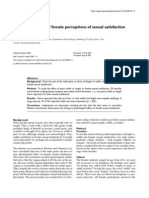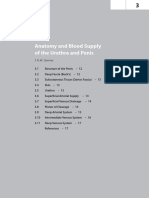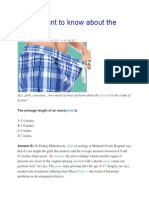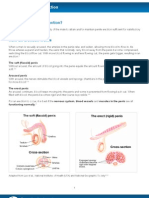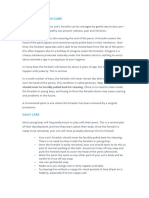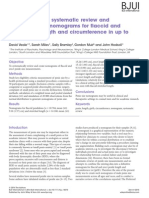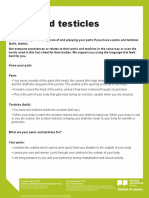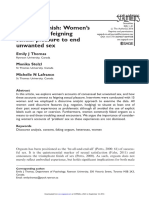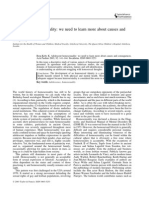Women's Preferences For Penis Size: A New Research Method Using Selection Among 3D Models
Women's Preferences For Penis Size: A New Research Method Using Selection Among 3D Models
Uploaded by
Gustavo FigueroaCopyright:
Available Formats
Women's Preferences For Penis Size: A New Research Method Using Selection Among 3D Models
Women's Preferences For Penis Size: A New Research Method Using Selection Among 3D Models
Uploaded by
Gustavo FigueroaOriginal Title
Copyright
Available Formats
Share this document
Did you find this document useful?
Is this content inappropriate?
Copyright:
Available Formats
Women's Preferences For Penis Size: A New Research Method Using Selection Among 3D Models
Women's Preferences For Penis Size: A New Research Method Using Selection Among 3D Models
Uploaded by
Gustavo FigueroaCopyright:
Available Formats
RESEARCH ARTICLE
Women's Preferences for Penis Size: A New
Research Method Using Selection among 3D
Models
Nicole Prause1*, Jaymie Park1, Shannon Leung1, Geoffrey Miller2
1 Department of Psychiatry, University of California Los Angeles, Los Angeles, California, United States of
America, 2 Department of Psychology, University of New Mexico; Albuquerque, New Mexico, United States
of America
These authors contributed equally to this work.
These authors also contributed equally to this work.
* nicole.prause@gmail.com
a11111 Abstract
Womens preferences for penis size may affect mens comfort with their own bodies and
may have implications for sexual health. Studies of womens penis size preferences typi-
cally have relied on their abstract ratings or selecting amongst 2D, flaccid images. This
study used haptic stimuli to allow assessment of womens size recall accuracy for the first
OPEN ACCESS time, as well as examine their preferences for erect penis sizes in different relationship con-
texts. Women (N = 75) selected amongst 33, 3D models. Women recalled model size accu-
Citation: Prause N, Park J, Leung S, Miller G (2015)
Women's Preferences for Penis Size: A New rately using this method, although they made more errors with respect to penis length than
Research Method Using Selection among 3D circumference. Women preferred a penis of slightly larger circumference and length for
Models. PLoS ONE 10(9): e0133079. doi:10.1371/ one-time (length = 6.4 inches/16.3 cm, circumference = 5.0 inches/12.7 cm) versus long-
journal.pone.0133079
term (length = 6.3 inches/16.0 cm, circumference = 4.8 inches/12.2 cm) sexual partners.
Editor: Heather Hoffmann, Knox College, UNITED These first estimates of erect penis size preferences using 3D models suggest women
STATES
accurately recall size and prefer penises only slightly larger than average.
Received: February 11, 2015
Accepted: June 22, 2015
Published: September 2, 2015
Copyright: 2015 Prause et al. This is an open Introduction
access article distributed under the terms of the
Creative Commons Attribution License, which permits Both men and women often have reported discomfort with the appearance of their genitals.
unrestricted use, distribution, and reproduction in any While not as common of a concern as body weight, muscularity, amount of head hair and body
medium, provided the original author and source are hair, or height, penis size was a concern for 68.3% of 200 men in one study [1]. Concerns about
credited.
genital appearance are unique compared to other concerns about physical appearance. First,
Data Availability Statement: All relevant data are only intimate partners generally know the appearance of genitals. In contrast to the penis, body
available via Figshare (http://dx.doi.org/10.6084/m9. weight, acne, and other features are easily observed, informing feelings of attraction early in
figshare.1466782).
interactions. While indicators of penis size include ethnicity [2] and finger length and ratio [3,
Funding: These authors have no support or funding 4], most proposed cues of penis size, including male height and foot size [5], weight [6, 7], shoe
to report. size [8], and age [9], are unreliable. Second, no diet, pill, or exercise regime affects the size or
Competing Interests: The authors have declared shape of genitals. However, about half of men in one study believed that they could change
that no competing interests exist. their penis size through non-surgical means [10]. Little can be done to change the appearance
PLOS ONE | DOI:10.1371/journal.pone.0133079 September 2, 2015 1 / 17
Women's Preferences for Penis Size
of the penis. Contrary to some public opinion, it also is worth noting that discomfort with the
appearance of the penis is not impacted [11], or is positively impacted [12], by viewing sex
films. Given that only intimate partner(s) view the penis, the appearance is relatively immuta-
ble, and sex films are not causing dissatisfaction, partner perceptions of the penis appearance
seem to most likely to impact mens feelings about the features of their penis.
The expectations that men have about womens penis size preferences appear to drive anxi-
ety and dissatisfaction more than some inborn dissatisfaction. In the first questionnaire to
examine the nature of dissatisfaction with the penis directly, three of the ten items concerned a
partners perception [13]. These included I will be alone and without a partner and I will be
laughed at by a partner in a sexual situation. These anxieties may be unnecessary. For exam-
ple, while men and women agreed that the ideal penis length was longer than what they
thought was average, men mistakenly reported that women would find an even longer penis
ideal than the women actually did [10]. Furthermore, most men seeking surgery to increase
their penis size (e.g., [14, 15]), actually fall within the normal penis size range [16].
Concerns about penis size affect mens sexual satisfaction and functioning. Of course, penis
size need not affect sexual functions like orgasm, sexual drive, or pain experience. However,
men who are less satisfied with their penis report more sexual health problems [17]. A smaller
penis decreases sexual confidence [18], which may be why penis size is related to sexual func-
tion. Another reason penis size may be related to sexual functioning is that anxiety concerning
the partners response may be calculated as a cost of the relationship, which leads him to expe-
rience broad sexual dissatisfaction [19].
The context of the sexual relationship could influence penis size preferences. For example, the
goal of the sexual interaction with a one-night partner tends to be pleasure [20]. Women recog-
nize that infection risks are higher from a one-night partner [21]. While women adjust their
behaviors for this risk, being less likely to engage in anal sex [22] and more likely to use condoms
[23] with one-night partners, such risky behaviors themselves are often experienced as pleasur-
able [24]. On the other hand, vaginal intercourse always causes tears in the vaginal mucosa [25]
especially in the sensitive posterior fourchette [26], so women might prefer a smaller penis less
likely to stress their physiology for regular, long-term mates. Thus, women might shift their pref-
erences for penis size depending on the type and duration of sexual relationship.
Studies of penis size preference to date have relied on numerical size estimates, vague quali-
tative descriptions, or 2-D line drawings. For example, some studies have asked participants to
specify penis length preferences in centimeters [27]. Another study asked participants to indi-
cate their preference from reading erotic passages with three qualitative penis size options
(small, medium, large) [28]. Yet, humans judge sizes most accurately when visual and haptic
information are available together [29]. Both sources of data are usually available in sexual
interactions. Thus, in this study, three-dimensional (3D) models were used with the hope of
increasing accuracy, ecological validity, and external validity. Also, most studies of penis size
preference have portrayed or asked about the penis in its flaccid state [30, 31]. This may be
problematic, because the relationship between erect and flaccid sizes has been reported as neg-
ligible [32, 33] moderate (r = .44 in [34], r = .78 in [35]), and strong (rho = .77 in [6], r = .79 in
[32]). It is unclear how well flaccid size reflects erect size. Of course, intercourse can occur only
with a sufficiently rigid penis [36]. Thus, it seemed important to characterize preferences for
penis size in its erect state. The current study used 3D models of erect phalluses to characterize
womens penis size preferences for the first time.
Three-dimensional (3D) printing is just beginning to be used to assess shape perception and
categorization. On the one hand, visual 2D information as compared to haptic information
(from 3D) result in similar solutions for object similarity [37]. Each mode of information
(visual or haptic) also improves categorization in the other domain [38, 39]. 3D printing could
PLOS ONE | DOI:10.1371/journal.pone.0133079 September 2, 2015 2 / 17
Women's Preferences for Penis Size
allow representation of highly problem-specific, complex structures [39]. Haptic information
from 3D objects improved shape identification compared to raised lines alone [40] and
improves later performance in the visual domain [41], possibly by improving discriminability
[42]. Also, haptic information is robust to differences in perceptual acuity, such as occur with
aging [43], which make such stimuli attractive when the visual acuity of participants may vary.
This study extends the existing work using 3D stimuli to assess size preferences. This approach
also permitted characterization of womens ability to accurately recall the size of erect phallus
models for the first time.
When flaccid and stretched penis sizes are characterized [44], largely by self-measurement
[45], they predict erect size surprisingly poorly. Yet there are relatively few studies of erect
penis size. This may reflect cultural taboos against researchers or doctors interacting with men
who are in a sexually aroused state. One study had men judge their own erect size in relation to
a banknotes length [46]. Two studies of erect penis sizes provided kits for home measurement
[47, 48]. Such self-measurements of length and circumference show fairly good test-retest reli-
ability (r = .68 to .90, [47]). Pharmacologically-induced, physician-measured erections identi-
fied an average length of 12.89 cm (SD = 2.91) and circumference of 12.3 cm (SD = 2.9; [32]).
These were somewhat shorter in length (M = 14.15, SD = 2.7), yet similar in circumference
(M = 12.23, SD = 2.2), compared to a recent, large survey [48].
Womens penis preferences may vary with their relationship expectations. Women prefer
more masculine partners for shorter-term sexual relationships [20]. Women also value intelli-
gence more, and attractiveness less, for long term, as compared to short term, partners [49].
More masculine traits, such as lower voice pitch [50] and (to some extent) larger penis size [51,
52] are correlated with testosterone levels, which also may influence mens mating goals and
attractiveness. Since a larger penis size is perceived as more masculine [53, 54], we predict
women will prefer a larger penis for shorter-term sexual relationships.
Women likely make penis size judgments partly using their recalled experiences. Yet, it is
unclear how accurately women can recall penis size. Exposed to nude male images, women do
attend to the genital area [55, 56]. People can generally recall if a penis was described as large,
medium, or small, or not described at all [28]. In the current study, womens ability to recall
penis size was tested by match-to-sample recall, both immediately and after a delay of ten
minutes.
Materials and Methods
Stimuli: The penis models
Based on previous studies (see above) about the distributions of penis length and circumfer-
ence, the average American erect penis length was estimated as 6 inches (15.2 cm) and circum-
ference as 5 inches (12.7 cm). Models were created to range +/- 3.0 S.D. across each dimension
(see Fig 1). This resulted in length ranging 4.0 inches to 8.5 inches (10.2 cm to 21.6 cm), and
circumference (circumference) ranging from 2.5 inches to 7.0 inches (6.4 cm to 17.7 cm), using
0.5-inch (1.3 cm) increments (see Fig 1). This yielded a 10 X 10 matrix of 100 possible sizes.
However, such a large choice set could overwhelm participants. We chose to sample 1/3 of this
space, yielding 33 models across the range of space.
The penis model shape was a cylinder, representing the shaft, topped by a dome, represent-
ing the penis head (see Fig 2). Of course, the human penis shaft is comprised of three corpora
that could be better represented by a rounded triangle and a more complex glans. Also, no
veins, testicles, or other details of the penis were portrayed. These details were not represented
for three reasons. First, there are no mathematical descriptions available to accurately represent
normal proportions of more complex penile structure. Second, women generally rate male
PLOS ONE | DOI:10.1371/journal.pone.0133079 September 2, 2015 3 / 17
Women's Preferences for Penis Size
Fig 1. Sizes of printed models. Shading indicates the average penis length and girth in the USA. Bold indicates models used for recall (immediate/delayed,
counterbalanced) tests. Units are in inches.
doi:10.1371/journal.pone.0133079.g001
Fig 2. Penile Models. A) Computer graphic representation of one of the print files used to produce the 3D penis models. B) Examples of (4 of 33) 3D models
showing length in inches. A and D represent the largest and smallest models in the set, respectively; B and C represent the two models (counterbalanced)
used to test recall for size.
doi:10.1371/journal.pone.0133079.g002
PLOS ONE | DOI:10.1371/journal.pone.0133079 September 2, 2015 4 / 17
Women's Preferences for Penis Size
nudes as less attractive than heterosexual men rate female nudes [57], so making the penis
model more realistic might have provoked negative responses. Third, the study was focused on
overall penis size, not penis shape or surface details. While one motivation behind the current
study was to improve the ecological validity of the stimuli, these concerns suggested starting
with a more simplistic, erect penis model.
Dimensions of commercial penile models do not vary systematically, so they were not
appropriate for research purposes. Thus, the penis models were printed using a Makerbot
Replicator 2 in blue ABS plastic (Navy wool; printer files for replications are at http://www.
thingiverse.com/thing:518401). Files were created using object-oriented Tinkercad [58] and
compiled to.stl formats in G-Replicator [59]. Models were light-weight, sturdy plastic with a
smooth surface (see Fig 1). After printing, models were checked by measuring tape to ensure
accuracy of length and circumference. None required reprinting for accuracy. The models were
identified by randomly assigned letters (e.g., M, CC) written on the bottom of each. This
was done to reduce the influence of largest and smallest anchors and also to eliminate the
need for women to measure or infer specific size. The 33 models were evenly split (11, 11, 11)
in a three-tier wire basket to ease womens ability to find the desired model. Baskets were ran-
domly shuffled between participants to reduce selection bias.
Participants
Volunteer were recruited by flyers around the California university campus, the neighborhood,
and local physicians offices. The flyers stated that women were requested to volunteer for a
study concerning sexuality. The flyers also stated that participants must be female, at least 18
years old, sexually attracted to men, and would be paid $20. The flyer did not mention penis
size preferences. Women volunteered by either phone or an online form requesting a phone
call. They completed a phone screening to confirm their eligibility (e.g. being aged 18 or over,
being sexually attracted to men) before being scheduled as participants.
Procedures
Upon a participants arrival, the Informed Consent document was provided, and women were
given time to study it. Afterwards, they were given a chance to ask questions, then the experi-
menter asked whether they still wish to participate. If the participant verbally consented, the
experimental protocol started. The Informed Consent document stated that continuing at this
stage constituted consent. Participants never provided their names. Informed Consent was not
documented using identifiable personal information, because it was unclear whether the new
procedures might influence participants willingness to report their penis size preferences.
Next, the participant answered questionnaires (described below) presented on a computer
in a private room, using a secure connection, on private laboratory server space scripted by the
first author in php5. This took about 50 minutes and included the penis size preference tasks
and questionnaires (see below). Computer presentation of questionnaires has been shown to
increase the reporting of socially less desirable behaviors [60]. After the questionnaires, she
completed a 10-minute computer task (data to be reported elsewhere) assessing attention to
sexual images. Afterwards, the participants was debriefed, offered the opportunity to ask ques-
tions, and given $20 cash. The study protocol, including Informed Consent protocol, was
approved by the University of California, Institutional Review Board.
Questionnaire
The self-report questionnaires included demographic information (e.g., age, ethnicity, sexual
orientation), sexual history (e.g., number of sexual partners, sexual coercion, whether penis
PLOS ONE | DOI:10.1371/journal.pone.0133079 September 2, 2015 5 / 17
Women's Preferences for Penis Size
size played a role in relationship dissolution(s), etc.), and current sexual functioning (e.g.
orgasm rates, ease of lubrication, relationship monogamy status, pain during intercourse).
These were used to characterize the sample. Other personality questionnaires were included,
such as the Sexual Desire Inventory [61] and the Sociosexual Orientation Scale [62] to charac-
terize the sample.
Size preference and recall: Recall accuracy
After completing the other questionnaires, the experimenter entered with one of the two test
models. Two of the original 33 models were randomly selected and reprinted (indicated in
black cells in Fig 2). The experimenter informed the participant that she would be handed a
model. She was instructed that she would be asked to try to recall the size of the model after
inspecting it. During the inspection, she was asked not to measure the model using any objects
in the room, but no instruction was provided regarding how she used her own hands. Then,
the experimenter left for 30 seconds (without observing the participants inspection process),
returned, took the test model from the participant and out of the testing room, and asked the
participant to select which penis model (from the 33 described above) was most similar in size
to the test model she just handled. The participant recorded the letter code from the bottom of
that model into the computer.
The delayed-recall task was similar, except this time, the participant did not immediately
search for the model. Instead, she was given ten minutes to complete the penis size preference
questionnaire (below). The preference questionnaire would increase memory interference,
which is desirable for ecological validity as women asked to recall a former partners penis size
may have sex with other new partners in the delay. After this, the participant was instructed to
attempt to locate the second model (from the 33 described above). The test models were
counter-balanced, so the recall type (immediate or delayed) would not be confounded with test
model size (larger or smaller).
Size preference and recall: Penis Size Preferences
After completing the immediate recall task, participants answered 15 questions about their
penis size preferences. Each involved picking one penis size model from amongst the 33 models
available. The option No answer also was available for each. For this study, the key questions
were to select the model that they believed best reflected the average of men, which size is most
likely to carry a sexually transmitted infection, and which size she would prefer for different
expected relationship durations. The questions about preferences for different types of partners
were a bit more complex. For one-time partners the question was:
Imagine you're single and you're out at a restaurant with some friends. You meet an attrac-
tive man who is also single. He seems kind, intelligent, funny, and has a great job. You are
feeling sexually aroused. He says he's in town for a conference but he has to fly back home
tomorrow afternoon. If you could spend only this one night with him, what size would you
want him to be?
For long-term partners the question was: What would be the ideal size for a husband or
serious, long-term boyfriend? The question regarding shorter-term partners clearly included
much more detail. This was done in an attempt to control for intervening variables not of inter-
est. For example, if a woman doubted at all for her safety with an unknown partner, she might
select smaller models in the event of sexual assault. Thus, safety cues were included in the
characterization.
PLOS ONE | DOI:10.1371/journal.pone.0133079 September 2, 2015 6 / 17
Women's Preferences for Penis Size
Data analyses
Recall error was calculated as the difference of the dimension the participant chose minus the
size of the actual sample. Thus, a positive number would indicate that participants chose a
model larger than what they were shown. A within-participant ANOVA was calculated with
the interaction of dimension (length, circumference) by recall (immediate, delayed. Put
another way, the accuracy of recall could be affected by length or circumference being recalled
better than the other dimension (dimension factor), by the length of the delay was until they
selected a model (recall), or an interaction where length or circumference were recalled better
at either the shorter or longer delay.
Descriptive data are provided regarding the size that women believed was average and the
range women indicated for their smallest and largest sexual partner. To test whether wom-
ens preferences differ by partner type, an ANOVA with dimension (length, circumference) X
partner (one-time, long term) predicting preferred inches was conducted. A custom model was
specified without dimension as a main effect, because dimensions were stipulated to be differ-
ent in the generation of the stimuli.
Results
Participant demographics and sexual experience
All participants (N = 75) were screened to report sexual attraction to men, and ranged in age
from 18 to 65. They were California residents, mostly white or Asian, sexually experienced, cur-
rently in a sexual relationship, and had sex recently (see Table 1). Twenty-seven percent of
women reported that they had ended a relationship due, in part, to a mismatch between their
penis size preference and their partners penis size (see Table 1). More women cited that the
penis was too small as a problem, rather than that the penis was too large. The length and cir-
cumference of the model that each woman believed best represented the average penis size is
presented in Figs 3 and 4 shows every womans selection of the smallest and largest sexual
partner with whom she had contact.
Recall accuracy
Most (N = 48) women selected the exactly correct model (in both length and circumference) at
immediate recall (see Fig 5). About half (N = 31) of women selected exactly the correct model
at delayed recall. There was a main effect of dimension predicting model selection error (F
(1,73) = 11.6, p < .001, p2 = .14): participants slightly underestimated penis length after the
recall interval (M = -0.18 inches or -0.46 cm error), but were very accurate recalling penis cir-
cumference (M = 0.02 inches or 0.05 cm error). There was no main effect of delay nor dimen-
sion X delay interaction despite high power (f = .1, r = .9, 1- = .97). Given the high accuracy,
analyses for preferences were conducted as planned.
Does the expected relationship duration affect penis size preference?
For the penis size preferences for one-time or long-term partners, 15 women indicated No
answer. Analyses were conducted on the remaining participants (N = 60). There was a small
main effect for expected relationship duration, F(1,59) = 4.4, p = .04, p2 = .07 (see Fig 6), such
that participants preferred a slightly larger penis size in one-time (length = 6.4 inches or 16.3
cm, circumference = 5.0 inches or 12.7 cm) partners as compared to long-term partners
(length = 6.3 inches or 16.0 cm, circumference = 4.8 inches or 12.2 cm). There was no interac-
tion of dimension (length, circumference) and relationship duration. Using independent t-tests
separately predicting length and circumference preferences for partner type resulted in a
PLOS ONE | DOI:10.1371/journal.pone.0133079 September 2, 2015 7 / 17
Women's Preferences for Penis Size
Table 1. Demographic characteristics of participants.
Variable M SD
Age 24.7 10.5
Intercourse partners (last 12 months) 3.2 5.3
Intercourse partners (in lifetime) 6.0 9.0
Number of penises touched (lifetime) 6.8 9.0
Na %
Sexual orientation (self-identied)
Heterosexual 36 57.1
Bisexual 10 15.9
Lesbianb 8 12.7
Asexual 6 9.5
Queer 3 4.8
Did not identify 11 14.7
Racec
White 28 37.3
Asian 24 32.0
Hispanic (non-white) 16 21.3
Black 10 13.3
Pain with intercourse
None 28 37.3
Mild 20 26.7
Discomforting to excruciating 27 36.0
Frequency of intercourse (last month)
Not once 26 35.1
1 to 3 times a month 22 29.3
About once a week 10 13.5
2 or 3 times a week 13 17.6
4 times a week or more 3 4.0
One night stand experience (lifetime)
Not once 34 45.3
Once or more 41 54.7
Penis size concernd
A lot more 0 0
A little more 11 15
About the same as other women 37 49
A little less 13 18
A lot less 12 16
Relationship ended due to penis size preferencee
Penis too large 5 7
Penis too small 15 21
a
Numbers may not sum to total due to non-response.;
b
Recall that participants were required to report attraction to men to participate, thus a Homosexual/
Lesbian self-identity did not preclude attraction to men;
c
Participants were allowed to indicate more than one option. Top 4 endorsed races or ethnicities are
included.
d
Question wording How much do you think you care about penis size compared to other women?
e
Question wording Have you ever stopped seeing a man because, among other reasons, his penis was
too large[small] compared to what you wanted?, number indicates count endorsing.
doi:10.1371/journal.pone.0133079.t001
PLOS ONE | DOI:10.1371/journal.pone.0133079 September 2, 2015 8 / 17
Women's Preferences for Penis Size
Fig 3. Size of model selected by women indicating the average penis size. (N = 75, r = .48).
doi:10.1371/journal.pone.0133079.g003
significant difference for the test of circumference (t(59) = 2.4, p = .02, d = .2) only. Women
preferred a larger circumference in one-time partners (M(SD) = 5.0(.1)) relative to long-term
partners (M(SD) = 4.8(.1)). As ANOVA corrects for multiple comparisons, it is a more appro-
priate statistical test for these data. These t-tests are noted for full disclosure of the analyses
conducted. Only 16 women selected a model as most likely to have an STI, whereas most
women declined to select a model. Of the women who did respond, the model selected as most
likely to have an STI was significantly larger (M(SD) = 6.2(.3)) than the model women used to
indicate their one-night stand (M(SD) = 5.8(.2)) preference, F(1,15) =, p = .01, p2 = .35. This
finding did not vary by the dimension (length, circumference).
Discussion
Women attended one session in the laboratory during which they completed questionnaires
about their sexual history and selected among 3D erect penis models to indicate their size pref-
erences for one-time or longer-term partners. The state-space appeared to well-characterize
the range of womens experience, as their largest and smallest partners did not show evi-
dence of ceiling or floor effects. Women tended to recall the size of the 3D models very well,
only underestimating penis length. Women preferred a larger penis size (especially a larger cir-
cumference) for one-time partners as compared to long-term partners. While this preference
for a larger phallus is above the average penis size, it is only very slightly above the average.
PLOS ONE | DOI:10.1371/journal.pone.0133079 September 2, 2015 9 / 17
Women's Preferences for Penis Size
Fig 4. Largest and smallest penis experiences. No evidence of ceiling or floor effects in womens choices indicating their largest and smallest sexual
partners penis size.
doi:10.1371/journal.pone.0133079.g004
While most declined to identify a penis size most likely to carry an STD, women selected even
larger phallus sizes as the most likely to be infected with an STD.
A delay in model recall did not significantly worsen participants recall of the model size. In
fact, women were generally very accurate in identifying the same model at both immediate and
delayed recall. When they did make errors, they slightly underestimated model length. One
possible explanation is that women care more about circumference, so they may attend to it
more [63]. Some authors have argued that penis length actually is more important and
PLOS ONE | DOI:10.1371/journal.pone.0133079 September 2, 2015 10 / 17
Women's Preferences for Penis Size
Fig 5. Recalled sizes (immediate and delayed) slightly shorter than actual model with most picking exact model. Note: 0 indicates the exact correct
model was chosen. Positive values indicate that the selected model was larger than the target model.
doi:10.1371/journal.pone.0133079.g005
healthy to desire than circumference (e.g., [64, 65]), but others have not replicated this
reported pattern.
These data are generally consistent with Mautz et al. (2013), which asked women to rate the
attractiveness of life-sized, projected, rotating drawings of male figures with flaccid penises of
Fig 6. Preference for larger penis in one-time relative to long-term relationships.
doi:10.1371/journal.pone.0133079.g006
PLOS ONE | DOI:10.1371/journal.pone.0133079 September 2, 2015 11 / 17
Women's Preferences for Penis Size
various sizes. Their participants preferred phalluses 2SD above their estimated population-
average penis size, whereas our participants preferred penises that were only a little above aver-
age. This difference may be due to their images depicting flaccid penises, whereas our models
depicted erect penises.
Since womens preferences for both relationship types were slightly larger than the average
male, the preferred size for the one-time partner was farther from the average. Novelty itself
contributes to pleasure [66], so seeking a more novel-sized penis may be consistent with a goal
to pursue pleasure primarily in one-time partners. Women may prefer a smaller penis size in a
long-term partner compared to a one-time partner for reasons of both physical comfort and a
preference for less masculinity in a longer term partner [67]. The difference in pleasure motive
is also suggested by genital physiology. A larger circumference might stretch the vaginal open-
ing such that the deep structures (clitoral crura and vestibular bulbs) are more stimulated, and
the clitoral glans is more stimulated by penis movement [68]. Also, the vagina is densely
packed with pressure-sensitive mechanoreceptors that detect stretch sensations [69]. These
appear finely tuned to detect variability in circumference, whereas the vagina is less sensitive to
differences in other stimuli such as vibration or warmth [70]. Other studies also found that
women prefer a relatively larger penis proportional to body size [31], especially with respect to
circumference (e.g., [54]). Given that women typically experience more pleasurable and orgas-
mic sex in longer-term relationships [71], they might prefer a larger penis for short-term sex
partly so the increased physical sensation compensates for the reduced psychological connec-
tion. In one notable exception, a preference for general body somatotype did not differ by the
relationship duration [brief uncommitted versus long-term partners in 72].
A larger penis could contribute to infection risks, such that a larger penis on more risky
one-time partners elevates risk. A larger penis has been associated with higher infection rates
amongst men who have sex with men [73]. Also, an increase in friction during intercourse
from a condom is associated with the introduction of more bacteria into the vagina [74, 75]
and more vulvar erythema [74]. Finally, women report that condoms increase their experience
of pain during intercourse [76, 77]. Anything that increases friction during intercourse may
promote genital injury, indirectly increasing infection risk. A larger phallus would increase fric-
tion relative to a smaller phallus. These potential complications of a larger penis suggest why
the human penis has not evolved to be larger.
Individual differences among the women were not examined in relationship to their penis
size preferences, although various female traits could interact with their sexual health risks. For
example, women with wider hips tend to have a higher proportion of one-time sexual partners
[78]. While womens vaginal depth and pelvic muscle tonicity has been characterized [79, 80],
these traits have never been related to womens penis size preferences. Presumably, given the
variability in vaginal size and tonicity, some women would experience more tearing with a
larger phallus than other depending on the morphology of their particular vagina.
Generating haptic stimuli was relatively cost-effective and simple. Free software was avail-
able for generating print files. Also, the print files are shared online to allow exact future repli-
cations. Undergraduate research assistants were able to create and monitor the work flow. The
3D printer used is now widely, cheaply commercially available. Expanding this model into
preferences pertaining to other domains, or even for other penis shape preferences, appears
desirable.
As a first study using life-sized 3D models of erect penises to investigate preferences, some
limitations exist. Models were not perfectly ecologically valid. They were blue to minimize
racial skin-color cues. They were made with rigid, odorless plastic. They were a simplified
dome-on-cylinder form rather than realistically shaped and textured. The male body was nei-
ther described nor portrayed. There were also limitations of self-report approaches. Men and
PLOS ONE | DOI:10.1371/journal.pone.0133079 September 2, 2015 12 / 17
Women's Preferences for Penis Size
women appear to have actually become less approving of one-time sexual partners since 2001
[81], which may affect the preferences that they are willing to report regarding such partners.
Also, a significant minority (15 of 75) of women chose not to report a preference for penis size
in short and long term partners, but did answer both of the recall questions. Perhaps these
women did not have a clear preference, consistent with weak penis size preferences reported in
some previous studies [54, 65]. This could be viewed as a strength, insofar as women did not
feel compelled to answer in cases where they did not feel they had a strong enough basis to gen-
erate an answer.
Another limitation is sexual inexperience among some participants. Fifteen women in our
sample indicated that they had never experienced sexual intercourse. This inexperience could
underlie some of the size preferences observed. For example, women generally anticipate more
pain with their first intercourse than they actually experience [82], so they may show risk-
averse penis size preferences (for shorter length and thinner circumference than they may pre-
fer with experience). Less experienced women may also be less accurate in their size estimates.
However, a follow-up analysis showed that having had sexual intercourse (yes or no) did not
predict penis size preferences, arguing against this possibility. A related limitation is that the
experimental protocol necessarily limited the sample size, and these women were recruited
largely near a college campus. There may be other biases in the sample related to the recruit-
ment method and sample size that were not identified.
There are several implications of these data for males interested in long-term female part-
ners. Males with a larger penis may be at an advantage when pursuing short-term female part-
ners. Also, this study provides the first data on the accuracy of womens penis size judgments.
Furthermore, women tended to slightly underestimate the length of penis models after a recall
delay. Women may misremember specific partners penis attributes as smaller than they really
are. This may exacerbate mens anxieties about their penis size. Men dissatisfied with their
penis size have historically benefitted more from counseling than from surgically increasing
their penis size [83]. This may help explain why most men seeking surgical interventions for
enlarging what they perceive to be a small penis actually have a penis that falls within a normal
range [16]. Finally, 3D printing allows greater flexibility and complexity in stimuli and highly
accurate replications. This first use of 3D stimuli to assess preferences is promising. Increasing
print resolution and animation will broaden the research applications with haptic stimuli.
Acknowledgments
The authors would like to thank numerous research assistants at University of California, Los
Angeles for their assistance with data collection. We also thank Ardershir Rahman for assis-
tance with model design and printing.
Author Contributions
Conceived and designed the experiments: NP GM. Performed the experiments: NP JP SL. Ana-
lyzed the data: NP JP SL GM. Contributed reagents/materials/analysis tools: NP. Wrote the
paper: NP JP SL GM.
References
1. Tiggemann M, Martins Y, Churchett L. Beyond muscles: Unexplored parts of men's body image. Jour-
nal of Health Psychology. 2008; 13(8):116372. doi: 10.1177/1359105308095971 PMID: 18987089
2. Cheng PK, Chanoine JP. Should the Definition of Micropenis Vary According to Ethnicity? Hormone
Research in Paediatrics. 2001; 55(6):27881.
3. Choi IH, Kim KH, Jung H, Yoon SJ, Kim SW, Kim TB. Second to fourth digit ratio: a predictor of adult
penile length. Asian Journal of Andrology. 2011; 13:7104. doi: 10.1038/aja.2011.75 PMID: 21725330
PLOS ONE | DOI:10.1371/journal.pone.0133079 September 2, 2015 13 / 17
Women's Preferences for Penis Size
4. Shalaby ME, Almohsen AERM, El Shahid AR, Abd Al-Sameaa MT, Mostafa T. Penile length
somatometric parameters relationship in healthy Egyptian men. Andrologia. 2014:n/an/a. doi: 10.
1111/and.12275
5. Siminoski K, Bain J. The relationships among height, penile length, and foot size. Annals of Sex
Research. 1993; 6(3):2315. doi: 10.1007/bf00849563
6. Ponchietti R, Mondaini N, Bonafe M, Di Loro F, Biscioni S, Masieri L. Penile length and circumference:
a study on 3,300 young Italian males. European urology. 2001; 39(2):1836. Epub 2001/02/27. 52434.
PMID: 11223678.
7. Soylemez H, Atar M, Sancaktutar AA, Penbegul N, Bozkurt Y, Onem K. Relationship between penile
size and somatometric parameters in 2276 healthy young men. Int J Impot Res. 2012; 24(3):1269.
doi: 10.1038/ijir.2011.53 PMID: 22189447
8. Shah J, Christopher N. Can shoe size predict penile length? BJU International. 2002; 90(6):5867. doi:
10.1046/j.1464-410X.2002.02974.x PMID: 12230622
9. Schneider T, Sperling H, Lmmen G, Syllwasschy J, Rbben H. Does penile size in younger men
cause problems in condom use? a prospective measurement of penile dimensions in 111 young and
32 older men. Urology. 2001; 57(2):3148. http://dx.doi.org/10.1016/S0090-4295(00)00925-0. PMID:
11182344
10. Johnston L, McLellan T, McKinlay A. (Perceived) Size really does matter: Male dissatisfaction with
penis size. Psychology of Men and Masculinity. 2014; 15(2):2258.
11. Peter J, Valkenburg PM. Does exposure to sexually explicit Internet material increase body dissatisfac-
tion? A longitudinal study. Computers in Human Behavior. 2014; 36(0):297307. http://dx.doi.org/10.
1016/j.chb.2014.03.071.
12. Kvalem IL, Tren B, Lewin B, tulhofer A. Self-perceived effects of Internet pornography use, genital
appearance satisfaction, and sexual self-esteem among young Scandinavian adults. Cyberpsychol-
ogy: Journal of Psychosocial Research on Cyberspace. 2014; 8(4). doi: 10.5817/CP2014-4-4
13. Veale D, Eshkevari E, Read J, Miles S, Troglia A, Phillips R, et al. Beliefs about Penis Size: Validation
of a Scale for Men Ashamed about Their Penis Size. The Journal Of Sexual Medicine. 2014; 11(1):84
92. doi: 10.1111/jsm.12294 PMID: 24118940
14. Nabil N, Hosny H, Kadah A, Shamloul R. Evaluation of Surgical Outcome of Penile Augmentation and
Lengthening Procedures. Urologia internationalis. 2013; 90(4):4659. doi: 10.1159/000347044 PMID:
23548799
15. Kang D, Chung J, Kim Y, Lee H, Cho S, Chang T, et al. Efficacy and Safety of Penile Girth Enhance-
ment by Autologous Fat Injection for Patients with Thin Penises. Aesth Plast Surg. 2012; 36(4):8138.
doi: 10.1007/s00266-012-9891-4
16. Mondaini N, Ponchietti R, Gontero P, Muir GH, Natali A, Di Loro F, et al. Penile length is normal in most
men seeking penile lengthening procedures. International Journal of Impotence Research. 2002; 14
(4):283.
17. Herbenick D, Schick V, Reece M, Sanders SA, Fortenberry JD. The Development and Validation of the
Male Genital Self-Image Scale: Results from a Nationally Representative Probability Sample of Men in
the United States. The Journal Of Sexual Medicine. 2013; 10(6):151625. doi: 10.1111/jsm.12124
PMID: 23551571
18. Althof SE, Cappelleri JC, Shpilsky A, Stecher V, Diuguid C, Sweeney M, et al. Treatment responsive-
ness of the Self-Esteem And Relationship questionnaire in erectile dysfunction. Urology. 2003; 61
(5):88892. Epub 2003/05/09. PMID: 12735997.
19. Lawrance K-A, Byers ES. Sexual satisfaction in long-term heterosexual relationships: The interper-
sonal exchange model of sexual satisfaction. Personal Relationships. 1995; 2(4):26785. doi: 10.1111/
j.1475-6811.1995.tb00092.x
20. Li NP, Kenrick DT. Sex similarities and differences in preferences for short-term mates: What, whether,
and why. Journal of Personality and Social Psychology. 2006; 90(5):46889. Epub 3.
21. Royer HR, Falk EC, Heidrich SM. Genital Herpes Beliefs: Implications for Sexual Health. Journal of
Pediatric and Adolescent Gynecology. 2013; 26(2):10916. http://dx.doi.org/10.1016/j.jpag.2012.11.
007. doi: 10.1016/j.jpag.2012.11.007 PMID: 23337309
22. Jonason PK, Li NP, Richardson J. Positioning the Booty-Call Relationship on the Spectrum of Relation-
ships: Sexual but More Emotional Than One-Night Stands. The journal of sex research. 2010; 48
(5):48695. doi: 10.1080/00224499.2010.497984
23. Kissinger P, White S, Schmidt N, Taylor SN, Mena L, Lillis R, et al. O07.1 Sexual Relationship Impor-
tance and Condom Use Among Men Attending STD Clinics in Two Southern Cities in the United States.
Sexually transmitted infections. 2013; 89(Suppl 1):A38. doi: 10.1136/sextrans-2013-051184.0119
PLOS ONE | DOI:10.1371/journal.pone.0133079 September 2, 2015 14 / 17
Women's Preferences for Penis Size
24. Loewenstein GF, Weber EU, Hsee CK, Welch N. Risk as feelings. Psychological Bulletin. 2001; 127
(2):26786. PMID: 11316014
25. Zink T, Fargo JD, Baker RB, Buschur C, Fisher BS, Sommers MS. Comparison of Methods for Identify-
ing Ano-Genital Injury After Consensual Intercourse. The Journal of Emergency Medicine. 2010; 39
(1):1138. http://dx.doi.org/10.1016/j.jemermed.2008.08.024. doi: 10.1016/j.jemermed.2008.08.024
PMID: 19217245
26. Anderson SL, Parker BJ, Bourguignon CM. Changes in genital injury patterns over time in women after
consensual intercourse. Journal of Forensic and Legal Medicine. 2008; 15(5):30611. http://dx.doi.org/
10.1016/j.jflm.2007.12.007. doi: 10.1016/j.jflm.2007.12.007 PMID: 18511005
27. Johnston L, McLellan T, McKinlay A. (Perceived) Size Really Does Matter: Male Dissatisfaction With
Penis Size. Psychology of Men & Masculinity. 2014:No Pagination Specified.
28. Fisher WA, Branscombe NR, Lemery CR. The bigger the better? Arousal and attributional responses to
erotic stimuli that depict different size penises. The journal of sex research. 1983; 19(4):37796. doi:
10.1080/00224498309551199
29. Ernst MO, Banks MS. Humans integrate visual and haptic information in a statistically optimal fashion.
Nature. 2002; 415(6870):42933. PMID: 11807554
30. Dixson BJ, Dixson AF, Li B, Anderson MJ. Studies of human physique and sexual attractiveness:
Sexual preferences of men and women in China. American Journal of Human Biology. 2007; 19(1):88
95. doi: 10.1002/ajhb.20584 PMID: 17160976
31. Mautz BS, Wong BBM, Peters RA, Jennions MD. Penis size interacts with body shape and height to
influence male attractiveness. Proceedings of the National Academy of Sciences. 2013. doi: 10.1073/
pnas.1219361110
32. Wessells H, Lue TF, McAninch JW. Penile Length in the Flaccid and Erect States: Guidelines for Penile
Augmentation. The Journal Of Urology. 1996; 156(3):9957. http://dx.doi.org/10.1016/S0022-5347(01)
65682-9. PMID: 8709382
33. Sengezer M, ztrk S, DevecI M. Accurate Method for Determining Functional Penile Length in Turkish
Young Men. Annals of Plastic Surgery. 2002; 48(4):3815. PMID: 12068220
34. Awwad Z, Abu-Hijleh M, Basri S, Shegam N, Murshidi M, Ajlouni K. Penile measurements in normal
adult Jordanians and in patients with erectile dysfunction. Int J Impot Res. 2004; 17(2):1915.
35. Furr KD. Penis size and magnitude of erectile change as spurious factors in estimating sexual arousal.
Annals of Sex Research. 1991; 4(34):26579. 1992-43496-001 08434611,4,34,265279,1991.
36. Udelson D, Park K, Sadeghi-Najed H, Salimpour P, Krane RJ, Goldstein I. Axial penile buckling forces
vs Rigiscan radial rigidity as a function of intracavernosal pressure: Why Rigiscan does not predict func-
tional erections in individual patients. International Journal of Impotence Research. 2000; 11:32739.
37. Gaiert N, Wallraven C, Blthoff HH. Visual and haptic perceptual spaces show high similarity in
humans. Journal of Vision. 2010; 10(11). doi: 10.1167/10.11.2
38. Wallraven C, Blthoff H, Waterkamp S, van Dam L, Gaiert N. The eyes grasp, the hands see: Metric
category knowledge transfers between vision and touch. Psychonomic Bulletin & Review. 2014; 21
(4):97685. doi: 10.3758/s13423-013-0563-4
39. Yildirim I, Jacobs RA. Transfer of object category knowledge across visual and haptic modalities:
Experimental and computational studies. Cognition. 2013; 126(2):13548. http://dx.doi.org/10.1016/j.
cognition.2012.08.005. doi: 10.1016/j.cognition.2012.08.005 PMID: 23102553
40. Lawson R. Recognizing familiar objects by hand and foot: Haptic shape perception generalizes to
inputs from unusual locations and untrained body parts. Atten Percept Psychophys. 2014; 76(2):541
58. doi: 10.3758/s13414-013-0559-1 PMID: 24197503
41. Wallraven C. Touching on face space: Comparing visual and haptic processing of face shapes. Psy-
chonomic Bulletin & Review. 2014; 21(4):9951002. doi: 10.3758/s13423-013-0577-y
42. Gaiert N, Waterkamp S, Fleming RW, Blthoff I. Haptic Categorical Perception of Shape. PLoS One.
2012; 7(8):e43062. doi: 10.1371/journal.pone.0043062 PMID: 22900089
43. Norman JF, Kappers AL, Beers A, Scott AK, Norman H, Koenderink J. Aging and the haptic perception
of 3D surface shape. Atten Percept Psychophys. 2011; 73(3):90818. doi: 10.3758/s13414-010-0053-
y PMID: 21264712
44. Khan S, Somani B, Lam W, Donat R. Establishing a reference range for penile length in Caucasian Brit-
ish men: a prospective study of 609 men. BJU International. 2012; 109(5):7404. doi: 10.1111/j.1464-
410X.2011.10338.x PMID: 21711435
45. Gebhard P, Johnson AB. The Kinsey data: marginal tabulations of the 19381963 interviews. Philadel-
phia: WB Saunders, 1979.
PLOS ONE | DOI:10.1371/journal.pone.0133079 September 2, 2015 15 / 17
Women's Preferences for Penis Size
46. Brody S, Weiss P. Vaginal Orgasm Is Associated with Vaginal (Not Clitoral) Sex Education, Focusing
Mental Attention on Vaginal Sensations, Intercourse Duration, and a Preference for a Longer Penis.
The Journal Of Sexual Medicine. 2010; 7(8):277481. doi: 10.1111/j.1743-6109.2009.01469.x PMID:
19732304
47. Richters J, Gerofi J, Donovan B. Are condoms the right size(s)? A method for self-measurement of the
erect penis. Venerology. 1995; 8(2):7781.
48. Herbenick D, Reece M, Schick V, Sanders SA. Erect Penile Length and Circumference Dimensions of
1,661 Sexually Active Men in the United States. The Journal Of Sexual Medicine. 2014; 11(1):93101.
doi: 10.1111/jsm.12244 PMID: 23841855
49. Lee AJ, Dubbs SL, Von Hippel W, Brooks RC, Zietsch BP. A multivariate approach to human mate pref-
erences. Evolution and Human Behavior. 2014; 35(3):193203. http://dx.doi.org/10.1016/j.
evolhumbehav.2014.01.003.
50. Evans S, Neave N, Wakelin D, Hamilton C. The relationship between testosterone and vocal frequen-
cies in human males. Physiology & Behavior. 2008; 93(45):7838. http://dx.doi.org/10.1016/j.
physbeh.2007.11.033.
51. Baskin LS, Sutherland RS, DiSandro MJ, Hayward SW, Lipschutz J, Cunha GR. The Effect of Testos-
terone on Androgen Receptors and Human Penile Growth. The Journal Of Urology. 1997; 158
(3):11138. http://dx.doi.org/10.1016/S0022-5347(01)64400-8. PMID: 9258152
52. Boas M, Boisen KA, Virtanen HE, Kaleva M, Suomi AM, Schmidt IM, et al. Postnatal penile length and
growth rate correlate to serum testosterone levels: a longitudinal study of 1962 normal boys. European
journal of endocrinology / European Federation of Endocrine Societies. 2006; 154(1):1259. Epub
2005/12/31. doi: 10.1530/eje.1.02066 PMID: 16382001.
53. Eisenman R. Penis size: Survey of female perceptions of sexual satisfaction. BMC women's health.
2001; 1(1):1. Epub 2001/06/21. PMID: 11415468; PubMed Central PMCID: PMC33342.
54. Francken AB, van de Wiel HBM, van Driel MF, Weijmar Schultz WCM. What Importance Do Women
Attribute to the Size of the Penis? European urology. 2002; 42(5):42631. http://dx.doi.org/10.1016/
S0302-2838(02)00396-2. PMID: 12429149
55. Lykins AD, Meana M, Strauss GP. Sex differences in visual attention to erotic and non-erotic stimuli.
Archives of Sexual Behavior. 2008; 37(2):21928. PMID: 17668312
56. Nummenmaa L, Hietanen J, Santtila P, Hyn J. Gender and Visibility of Sexual Cues Influence Eye
Movements While Viewing Faces and Bodies. Archives of Sexual Behavior. 2012; 41(6):143951. doi:
10.1007/s10508-012-9911-0 PMID: 22402995
57. Lang PJ, Bradley MM, Cuthbert BN. International affective picture system (IAPS): Affective ratings of
pictures and instruction manual. Technical Report A-8. Gainesville, FL: University of Florida, 2008.
58. Backman K, Mononen M. Tinkercad. Available: https://tinkercad.com/about/2011.
59. Hoeken Z, Kintel M, Mayer A, Mets M. ReplicatorG. 2012.
60. Locke SD, Gilbert BO. Method of psychological assessment, self-disclosure, and experiential differ-
ences: A study of computer, questionnaire, and interview assessment formats. Journal of Social Behav-
ior & Personality. 1995; 10(1):25563.
61. Spector I, Carey M, Steinberg L. The Sexual Desire Inventory: Development, factor structure, and evi-
dence of reliability. Journal of Sex & Marital Therapy. 1996; 22(3):17590.
62. Simpson JA, Gangestad SW. Individual differences in sociosexuality: Evidence for convergent and dis-
criminant validity. Journal of Personality & Social Psychology. 1991; 60(6):87083. 1991-26250-001
00223514,60,6,870883,1991.
63. Francken AB, van de Wiel HB, van Driel MF, Weijmar Schultz WC. What importance do women attri-
bute to the size of the penis? European urology. 2002; 42(5):42631. Epub 2002/11/14. PMID:
12429149.
64. Francken AB, van de Wiel HBM, Van Driel MF, & Weijmar Schultz WCMW. What importance do
women attribute to size of the penis? European urology. 2002; 42:42631. PMID: 12429149
65. tulhofer A. How (Un)Important Is Penis Size for Women with Heterosexual Experience? Archives of
Sexual Behavior. 2006; 35(1):56. doi: 10.1007/s10508-006-8989-7 PMID: 16502148
66. Bunzeck N, Doeller CF, Dolan RJ, Duzel E. Contextual interaction between novelty and reward pro-
cessing within the mesolimbic system. Human Brain Mapping. 2012; 33(6):130924. doi: 10.1002/hbm.
21288 PMID: 21520353
67. Little AC, Jones BC, Penton-Voak IS, Burt DM, Perrett DI. Partnership status and the temporal context
of relationships influence human female preferences for sexual dimorphism in male face shape. Pro-
ceedings of the Royal Society of London Series B: Biological Sciences. 2002; 269(1496):1095100.
doi: 10.1098/rspb.2002.1984 PMID: 12061950
PLOS ONE | DOI:10.1371/journal.pone.0133079 September 2, 2015 16 / 17
Women's Preferences for Penis Size
68. Wallen K, Lloyd EA. Female sexual arousal: Genital anatomy and orgasm in intercourse. Hormones
and Behavior. 2011; 59(5):78092. http://dx.doi.org/10.1016/j.yhbeh.2010.12.004. doi: 10.1016/j.
yhbeh.2010.12.004 PMID: 21195073
69. Berman JR, Adhikari SP, Goldstein I. Anatomy and physiology of female sexual function and dysfunc-
tion: classification, evaluation and treatment options. European urology. 2000; 38(1):209. PMID:
10859437.
70. Vardi Y, Gruenwald I, Sprecher E, Gertman I, Yartnitsky D. Normative values for female genital sensa-
tion. Urology. 2000; 56(6):103540. PMID: 11113756
71. Armstrong EA, England P, Fogarty ACK. Accounting for Womens Orgasm and Sexual Enjoyment in
College Hookups and Relationships. American Sociological Review. 2012; 77(3):43562.
72. Dixson BJ, Grimshaw GM, Ormsby DK, Dixson AF. Eye-tracking womens preferences for mens
somatotypes. Evolution and Human Behavior. 2014; 35(2):739. http://dx.doi.org/10.1016/j.
evolhumbehav.2013.10.003.
73. Grov C, Parsons J, Bimbi D. The Association Between Penis Size and Sexual Health Among Men Who
Have Sex with Men. Archives of Sexual Behavior. 2010; 39(3):78897. doi: 10.1007/s10508-008-9439-
5 PMID: 19139986
74. Eschenbach DA, Patton DL, Hooton TM, Meier AS, Stapleton A, Aura J, et al. Effects of Vaginal Inter-
course with and without a Condom on Vaginal Flora and Vaginal Epithelium. Journal of Infectious Dis-
eases. 2001; 183(6):9138. doi: 10.1086/319251 PMID: 11237808
75. Soper DE, Brockwell NJ, Dalton HP. Evaluation of the effects of a female condom on the female lower
genital tract. Contraception. 1991; 44(1):219. http://dx.doi.org/10.1016/0010-7824(91)90103-M.
PMID: 1893699
76. Crosby R, Milhausen R, Mark K, Yarber W, Sanders S, Graham C. Understanding Problems with Con-
dom Fit and Feel: An Important Opportunity for Improving Clinic-Based Safer Sex Programs. J Primary
Prevent. 2013; 34(12):10915. doi: 10.1007/s10935-013-0294-3
77. Fennell J. And Isn't that the point?: pleasure and contraceptive decisions. Contraception. 2014; 89
(4):26470. http://dx.doi.org/10.1016/j.contraception.2013.11.012. doi: 10.1016/j.contraception.2013.
11.012 PMID: 24332430
78. Simpson V, Brewer G, Hendrie C. Evidence to Suggest that Womens Sexual Behavior is Influenced by
Hip Width Rather than Waist-to-Hip Ratio. Archives of Sexual Behavior. 2014:15. doi: 10.1007/
s10508-014-0289-z
79. Barnhart KT, Izquierdo A, Pretorius ES, Shera DM, Shabbout M, Shaunik A. Baseline dimensions of
the human vagina. Human Reproduction. 2006; 21(6):161822. doi: 10.1093/humrep/del022 PMID:
16478763
80. Pendergrass PB, Belovicz MW, Reeves CA. Surface Area of the Human Vagina as Measured from
Vinyl Polysiloxane Casts. Gynecologic and Obstetric Investigation. 2003; 55(2):1103. PMID:
12771458
81. Prah P, Copas AJ, Mercer CH, Clifton S, Erens B, Phelps A, et al. Consistency in reporting sensitive
sexual behaviours in Britain: change in reporting bias in the second and third National Surveys of Sex-
ual Attitudes and Lifestyles (Natsal-2 and Natsal-3). Sexually transmitted infections. 2013. doi: 10.
1136/sextrans-2013-051360
82. Weis DL. The experience of pain during women's first sexual intercourse: Cultural mythology about
female sexual initiation. Archives of Sexual Behavior. 1985; 14(5):42138. PMID: 4062539
83. Nugteren HM, Balkema GT, Pascal AL, Schultz WCMW, Nijman JM, van Driel MF. 18-Year Experience
in the Management of Men With a Complaint of a Small Penis. Journal of Sex & Marital Therapy. 2010;
36(2):10917. doi: 10.1080/00926230903554438
PLOS ONE | DOI:10.1371/journal.pone.0133079 September 2, 2015 17 / 17
You might also like
- WPS Results Table Amsterdam 2013Document18 pagesWPS Results Table Amsterdam 2013WPSdatabase75% (4)
- Vt230se English ManualDocument253 pagesVt230se English ManualQuang Bách100% (4)
- Sex and BreathlessnessDocument2 pagesSex and Breathlessnessbooter_bewareNo ratings yet
- Producers Bank of The Philippines Vs CADocument2 pagesProducers Bank of The Philippines Vs CAMac100% (1)
- AmlDocument12 pagesAmlireshaNo ratings yet
- 2012 Longer Penis OrgasmsDocument10 pages2012 Longer Penis OrgasmsLucano Alvares100% (1)
- Penis WidthDocument2 pagesPenis WidthGiorgia SanninoNo ratings yet
- The Penis Monologues And Diseases, A Simple Guide to The Condition, Diagnosis, Treatment And Related ConditionsFrom EverandThe Penis Monologues And Diseases, A Simple Guide to The Condition, Diagnosis, Treatment And Related ConditionsNo ratings yet
- Review: Incontinence: A Systematic Review. J Sex Med 2013 10:1682-1691Document10 pagesReview: Incontinence: A Systematic Review. J Sex Med 2013 10:1682-1691Anthony GarciaNo ratings yet
- Anatomy PenisDocument7 pagesAnatomy PenisalexNo ratings yet
- Factsheet: Low Libido (Sexual Desire)Document1 pageFactsheet: Low Libido (Sexual Desire)vdphbfiuNo ratings yet
- The History of Erectile DysfunctionDocument2 pagesThe History of Erectile DysfunctionSebastian Cardona LondoñoNo ratings yet
- My Partner Never Wants To Make Love. What'S Wrong?: Download Our Free Mega Herbal Ebook Here!Document6 pagesMy Partner Never Wants To Make Love. What'S Wrong?: Download Our Free Mega Herbal Ebook Here!feowfeowNo ratings yet
- Opperman Braun Clarke Rogers Orgasm JSRDocument23 pagesOpperman Braun Clarke Rogers Orgasm JSRZipidinili MalanadalaNo ratings yet
- All You Want To Know About The PenisDocument5 pagesAll You Want To Know About The PenisYassir ButtNo ratings yet
- Male Dyspareunia - UpToDate PDFDocument15 pagesMale Dyspareunia - UpToDate PDFCamilo HernandezNo ratings yet
- Sexually Transmitted DiseasesDocument6 pagesSexually Transmitted DiseasesIsis HernandezNo ratings yet
- Penis Size - Does It Matter ?Document4 pagesPenis Size - Does It Matter ?Dr. Muhammad TayubNo ratings yet
- Sexual ProblemsDocument7 pagesSexual Problemselan sudjanamihardjaNo ratings yet
- Costa MasturbationDocument2 pagesCosta MasturbationThomas HagnerNo ratings yet
- 13 Crucial Facts About Your PeniDocument3 pages13 Crucial Facts About Your PeniBelal AhmadNo ratings yet
- 4 / 7 Nuts: 2 / 7 BerriesDocument6 pages4 / 7 Nuts: 2 / 7 BerriesChiara OlivoNo ratings yet
- Erectile DysfunctionDocument10 pagesErectile DysfunctionsuksukNo ratings yet
- McCoy - Reasons For Pretending Orgasm InventoryDocument11 pagesMcCoy - Reasons For Pretending Orgasm InventoryCsanyi EditNo ratings yet
- G-Spot A Modern Gynecological MythDocument4 pagesG-Spot A Modern Gynecological MythKORGANCHNo ratings yet
- Portrait of An ExhibitionistDocument15 pagesPortrait of An Exhibitionist116 - Kencana NoorNo ratings yet
- The PenisDocument6 pagesThe Penisntambik21No ratings yet
- Female Penis, Male Vagina, and Their Correlated Evolution in A Cave Insect 2014Document5 pagesFemale Penis, Male Vagina, and Their Correlated Evolution in A Cave Insect 2014Amanda MichalskiNo ratings yet
- Puberty Boy Changes Girl ChangesDocument4 pagesPuberty Boy Changes Girl ChangesDannySasmitaNo ratings yet
- Penis and Foreskin CareDocument3 pagesPenis and Foreskin CareJust A DudeNo ratings yet
- Semen Facts - How Much You Know About These TadapolesDocument3 pagesSemen Facts - How Much You Know About These TadapolesRob MellonsNo ratings yet
- Recreation and Procreation: A Critical View of Sex in The Human FemaleDocument16 pagesRecreation and Procreation: A Critical View of Sex in The Human FemaleVictor MocioiuNo ratings yet
- Sexuality Among Older Adults-Holmes sp20Document11 pagesSexuality Among Older Adults-Holmes sp20api-437977619100% (1)
- Reliability and Validity of The Sexuality Scale 1Document18 pagesReliability and Validity of The Sexuality Scale 1Monica EnescuNo ratings yet
- Anatomy Female GenitaliaDocument70 pagesAnatomy Female GenitaliaHeni KurniawatiNo ratings yet
- Erectile Dysfunction-My StoryDocument13 pagesErectile Dysfunction-My StoryDarrin T. CrumpNo ratings yet
- Chapter - 4 Factors Affecting Homosexual Orientation & Its ImplicationDocument20 pagesChapter - 4 Factors Affecting Homosexual Orientation & Its ImplicationJelly Mea Vicente TareNo ratings yet
- Am I Normal - A Systematic Review and Construction of Nomograms For Flaccid and Erect Penis Length and Circumference in Up To 15 521 MenlDocument9 pagesAm I Normal - A Systematic Review and Construction of Nomograms For Flaccid and Erect Penis Length and Circumference in Up To 15 521 MenlBlack HoleNo ratings yet
- Masturbation AddictionDocument7 pagesMasturbation AddictionHussein MaherNo ratings yet
- Penile Length Is Normal in Most Men Seeking Penile Lengthening ProceduresDocument4 pagesPenile Length Is Normal in Most Men Seeking Penile Lengthening ProceduresNunuh Sulaeman100% (1)
- The Management of Premature Ejaculation: A Patient's GuideDocument16 pagesThe Management of Premature Ejaculation: A Patient's GuideIwan VsNo ratings yet
- Trauma Urologic: Dr.H.T.Farizal Fadil SP.BDocument51 pagesTrauma Urologic: Dr.H.T.Farizal Fadil SP.BAndria SaputraNo ratings yet
- Penis and TesticlesDocument7 pagesPenis and TesticlesRose WidantiNo ratings yet
- Is Stress Killing Your Sex Life: 7 Things You Must Do Now To Keep It AliveDocument5 pagesIs Stress Killing Your Sex Life: 7 Things You Must Do Now To Keep It AliveJed Diamond100% (1)
- PenisDocument2 pagesPenismichelle labaoNo ratings yet
- ProstateDocument7 pagesProstatePravesh SharmaNo ratings yet
- SexualDocument45 pagesSexualSharmela BrijmohanNo ratings yet
- Sexual SelfDocument24 pagesSexual SelfLady of the Light100% (1)
- The Minimally Invasive Penis Enlargement Platinum Procedure Discussed HereDocument3 pagesThe Minimally Invasive Penis Enlargement Platinum Procedure Discussed HerePenisEnlargersNo ratings yet
- Mechanism of Erection & EjaculationDocument15 pagesMechanism of Erection & Ejaculationmeez rameezNo ratings yet
- Sexual Precocity PDFDocument5 pagesSexual Precocity PDFmist73No ratings yet
- Thomas - Faking Orgasm To End Unwanted SexDocument21 pagesThomas - Faking Orgasm To End Unwanted SexCsanyi EditNo ratings yet
- Amputation of The Penis: A.Venugopalan PG 212 LAS. 164Document14 pagesAmputation of The Penis: A.Venugopalan PG 212 LAS. 164Shayan JuttNo ratings yet
- The Average Penis Size PDFDocument11 pagesThe Average Penis Size PDFRandy RobinsonNo ratings yet
- RulesDocument2 pagesRulesAbhishek ArunNo ratings yet
- Kegel For MenDocument4 pagesKegel For MenMohd KasimNo ratings yet
- An Orgasm Is Who Defines What An Orgasm Is?: Sexual and Relationship TherapyDocument8 pagesAn Orgasm Is Who Defines What An Orgasm Is?: Sexual and Relationship Therapytharuka1000No ratings yet
- Adolescent Homosexuality Causes&ConsequencesDocument5 pagesAdolescent Homosexuality Causes&Consequences雲開No ratings yet
- Abnormal Development of Female Genital TractDocument69 pagesAbnormal Development of Female Genital TractJerry CreedNo ratings yet
- Trazodone - Erectile DysfunctionDocument6 pagesTrazodone - Erectile DysfunctionteddypolNo ratings yet
- The Sexual SelfDocument30 pagesThe Sexual SelfGilbert BelmisNo ratings yet
- Idiopathic Central Precocious Puberty A Case ReportDocument8 pagesIdiopathic Central Precocious Puberty A Case ReportCarolyn CapisnonNo ratings yet
- First YearDocument19 pagesFirst Yearapi-3797997No ratings yet
- Thomas Hood: Gnan Srishti School of ExcellenceDocument8 pagesThomas Hood: Gnan Srishti School of ExcellenceShazia ParveenNo ratings yet
- LaajVanti EbookDocument179 pagesLaajVanti EbookSridhar YvNo ratings yet
- BRO Home Appliances enDocument11 pagesBRO Home Appliances enKhaled Sid Ahmed AbderahimNo ratings yet
- x50 M3u Links Tested Fnx20Document32 pagesx50 M3u Links Tested Fnx20Maverick ChukwuNo ratings yet
- AIS - Written ReportDocument10 pagesAIS - Written ReportMohammad Nowaiser MaruhomNo ratings yet
- Optimisation OF GSMDocument536 pagesOptimisation OF GSMgfrghhhyrddNo ratings yet
- WEEK 12b - Berk DeMarzo-Chp 8Document81 pagesWEEK 12b - Berk DeMarzo-Chp 8Suzan BekçiNo ratings yet
- Proposed Price Sheets V1 PDFDocument2 pagesProposed Price Sheets V1 PDFCTN2010No ratings yet
- 0620 Example Candidate Responses Paper 5Document26 pages0620 Example Candidate Responses Paper 5Hidayah TeacherNo ratings yet
- How To Download Bloomberg Data Into ExcelDocument8 pagesHow To Download Bloomberg Data Into Excel남상욱No ratings yet
- Share KhanDocument10 pagesShare KhangautammandalNo ratings yet
- Spencer Green Pathways PlannerDocument2 pagesSpencer Green Pathways PlannerspencerxgreenNo ratings yet
- Chapter 0. Prerequisites 0.3: Sum and Product Notation: Slides (Google Drive) Video (Youtube)Document5 pagesChapter 0. Prerequisites 0.3: Sum and Product Notation: Slides (Google Drive) Video (Youtube)HMXNo ratings yet
- GR 257697Document7 pagesGR 257697Mae Frances R. AberinNo ratings yet
- War of Roses Research PaperDocument6 pagesWar of Roses Research Papermoykicvnd100% (1)
- Installment Payment AgreementDocument1 pageInstallment Payment AgreementBaisy VillanozaNo ratings yet
- KONTAKT 610 KSP Reference ManualDocument232 pagesKONTAKT 610 KSP Reference ManualMarcos Martínez CánovasNo ratings yet
- Performance Task 1Document3 pagesPerformance Task 1Diana CortezNo ratings yet
- Infosys Test PaperDocument31 pagesInfosys Test PaperShreya ShettyNo ratings yet
- Origami Ball KusudamaDocument12 pagesOrigami Ball Kusudamalstopmotion100% (1)
- Have Mercy On Us AutosavedDocument11 pagesHave Mercy On Us AutosavedMyrel Cedron TucioNo ratings yet
- Compulsory Ethiopian Standard: CES XXDocument19 pagesCompulsory Ethiopian Standard: CES XXAbdella Mohammed AdemNo ratings yet
- A SWOT Analysis To Improve The Marketing of Young Coconut ChipsDocument10 pagesA SWOT Analysis To Improve The Marketing of Young Coconut ChipsPRO TradesmanNo ratings yet
- Principal Intuitionistic Fuzzy Ideals and Filters On A LatticeDocument14 pagesPrincipal Intuitionistic Fuzzy Ideals and Filters On A LatticeDalia MuraddNo ratings yet
- Menumbuhkan Minat Baca Masyarakat Melalui Taman Bacaan Masyarakat Berbasis Teknologi InformasiDocument12 pagesMenumbuhkan Minat Baca Masyarakat Melalui Taman Bacaan Masyarakat Berbasis Teknologi InformasiDani TrashNo ratings yet
- A Level Seminar ReadyDocument16 pagesA Level Seminar ReadyOnesmus GumisirizaNo ratings yet






